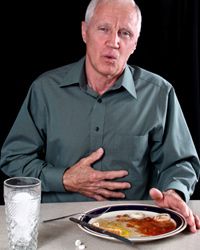There's nothing pleasant about heartburn, which manifests itself as burning pain in the chest. Even a written description of why heartburn occurs is unpleasant: It happens when stomach acid is regurgitated back up through the upper body thanks to an esophageal sphincter not closing at the right time. To many of us, heartburn seems like just another unpleasant thing to endure, much like taxes, rush hour traffic and the contents of a baby's diaper. For this reason, heartburn is often considered the Rodney Dangerfield of conditions, because it gets no respect. Most people don't take it seriously enough to put down the over-the-counter medications and speak to their doctor about it. So when should you bite the bullet and make an appointment with your doctor?
Advertisement





